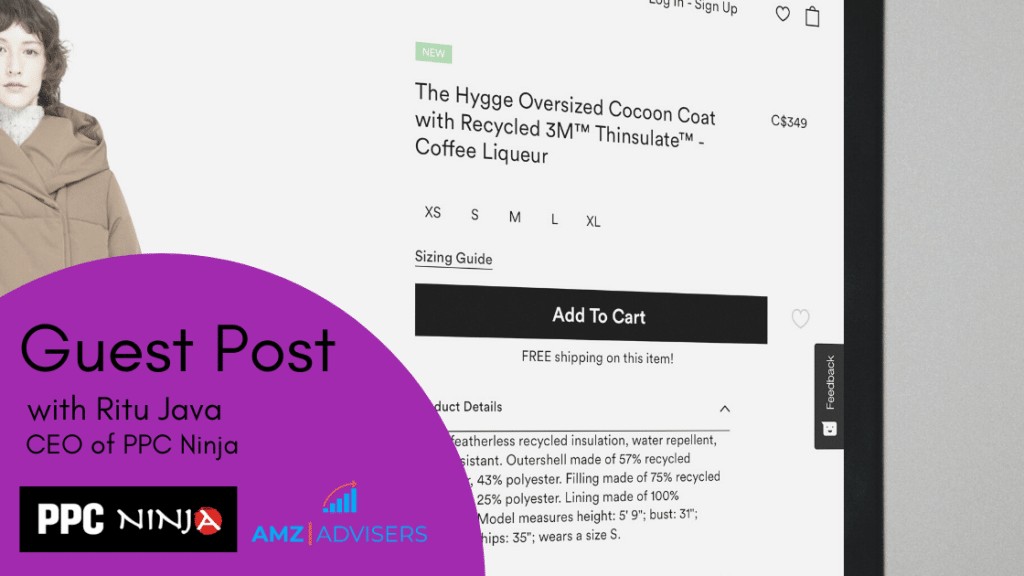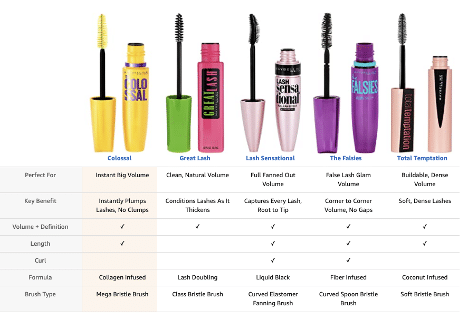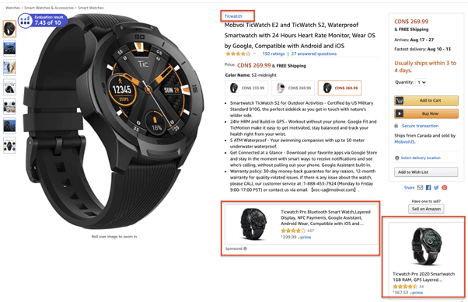
If you type ‘Gatorade’ into Amazon’s search bar, what do you expect to see? Gatorade, right? I did a little test to see if that was true, and thankfully it was. I also noticed that all the choices I was given above the fold were advertisements, not organic listings. Which means Gatorade is paying ad dollars to defend their branded keywords.

Amazon’s search results page has started to look more and more like this image, where the entire space above the fold is taken up by Sponsored Ads. What this means is that a busy shopper will be more likely to simply click on the first result that meets their needs regardless of whether it is paid or organic . Visually speaking the two are barely distinguishable except for the letters “Sponsored” written in tiny, light-grey font.
So the question is, should you throw money at your branded keywords to win prominent ad spots on Amazon?
What are Branded Keywords?
Branded keywords are search terms that are unique to your brand, sub-brands or SKUs. Examples include “Gatorade” or “Bolt24” are both branded keywords for Gatorade.
While Amazon recognizes your brand name and SKUs and should ideally prioritize showing your organic listings or ads when someone types your branded keywords over your competitor listings or ads, the truth is that this is not always the case.
Amazon’s A9 algorithm prioritizes search results that meet a multitude of criteria including relevance, bids, sales history and many more. Your close competitors who bid high on your branded terms may actually own a share of voice, especially if they have been proven to convert some of your traffic into sales of their products in the past. This kind of conversion data makes Amazon count even competitor offers as being ‘relevant’ to your brand and branded terms. Their auto and broad match algorithms use very association with competitors, against you.
I typed “Coke” in the search bar, expecting to see Coca Cola right up at the top. Guess who dominates those spots on Amazon? It’s Pepsi. For someone who doesn’t have a strong preference between the colas, Pepsi will work just fine. Pepsi has done a great job of paying their way to visibility by bidding heavily on the keyword “coke”.

Should I bid on my own Branded Keywords?
Sellers who are opposed to the idea of bidding on their branded keywords may make the following arguments:
- “If someone typed my brand name they already have purchase intent. They will find my organic listing regardless. Why pay Amazon for ads?”
- “I am not a mega brand so I’m ok not spending money on my brand name”
- “I’d rather use my budget to rank for other keywords”
While all these statements sound logical and valid, Amazon’s algorithmic choices and layouts force us into the pay-to-play game. We can’t rely on organic ranking alone, even for our own brand name. If we aren’t paying to grab all the spots that customers are expecting to find us in on page one, someone else will.
A Jungle of Distractions
Amazon, the Everything Store, is built upon enormous selection and variety. It’s a jungle of distractions, with no dearth of cheaper, better alternatives presented to shoppers at every stage of their journey. Baits like “Similar Products”, “Lower Priced Items to Consider” or “Sponsored Brands Similar to this Brand” pop up everywhere, even after items have been added to the cart.
What this means is that shorter purchase cycles become even more important for brand protection. You want to close the sale before too long, especially when a shopper came looking specifically for one of your products. Make it easy for them. Eliminate distractions.
Not advertising on branded keywords might give you short term savings, but know that there is competition and distraction lurking everywhere. If you don’t defend your space it will be quickly filled by an eager competitor.
Defending Your Brand
If you have research-heavy products, ones that involve compatibility considerations, then be aware that shoppers will want to make comparisons and your listing may not be their last stop.
There is a good chance that shoppers will step away to compare and contrast alternatives. If you have alternative choices from within your product line, then proactively give them prominence through A+ comparison tables. Keep shoppers close at hand with alternatives from your brand.

Traditional marketing thrives on cross sells and upsells that are designed to keep buyers in your funnel. If one product from your offerings doesn’t fully satisfy their needs, perhaps another one will. Show them that other one. An easy way to do this on Amazon is to run product targeting ads to your own brand. Product targeting ads show up on product detail pages in various spots.
TicWatch has two types of Sponsored Display ads on the detail page of one of their own products. This is a smart strategy to reduce any competitor distraction while providing alternatives in close proximity. It’s better to keep shoppers circling through choices from your own brand rather than letting them step away into a competitor’s funnel and lose them forever.

Tactics to Keep Buyers Close
What are all the ways in which smart sellers defend their brand through advertising? There are several offensive as well as defensive tactics they use that you can use as well. These will help you not only protect your space but also help you steal some sales from competitors who are not paying attention.Bid on your branded terms: Even if you bid low, you are in the game. Monitor share of voice, in other words, how often do you rank on page versus your competitors
1. Bid on your SKUs as keywords
Some people search for products by SKU. If they do, your ad targeting it will make sure they get to the right place quicker.
2. Bid on competitor SKUs and Brand Names
Find out what your competitor SKUs are and bid on them. Same goes for their brand names.
3. Sponsored Brands ads with Custom Images
Running these will win you visibility on “Sponsored Brands Related to Your Search” bars at the bottom of product detail pages.
4. Run Sponsored Products Product Targeting Ads to your own products
Occupy the maximum real estate on the detail page with your own brand.
5. Run Sponsored Display Product Targeting ads to your own products
This is similar to running Sponsored Products Product Targeting ads but with much better placements closer to the Buy Box and the bullet points
6. Run Product Targeting Ads on competing products
Play offensive as a way to steal traffic from pre-qualified audiences
7. Run Sponsored Display Audience – Purchase ads
These are remarketing ads that will bring back customers that have touched your products in the past. Since they are already familiar with your brand name, bringing them back is low hanging fruit, much easier to win
8. Target Relevant Categories
Running Category Targeting ads will help you gain visibility on categories that are similar or related to your own. This type of ad is like running an auto campaign but for products.
For more ideas on ads that you can set up today, refer to this post 10 Ideas for Amazon Product Targeting Ads. Grabbing eyeballs in multiple placements helps drive shoppers back to your brand, which is ultimately good for scaling your business and defending your brand.
Conclusion
Running more ads, smarter ads can actually make you more profitable than you think. The most successful advertisers win on Amazon with a very diversified ad portfolio, playing both defensive and offensive at many levels with fairly minimal investments. A lot of these ad types can be created with low bids and budgets to provide placeholders for Amazon’s ad machinery, the absence of which could cost you more than the price of defending the brand you worked so hard to build.
About the Author

Ritu Java is the CEO of PPC Ninja, Amazon PPC Tools and Services. She helps 6, 7 and 8 figure sellers optimize and scale their businesses through advertising. Ritu regularly contributes articles to the PPC Ninja blog, on LinkedIn and shares her knowledge on various podcasts and mastermind groups.



